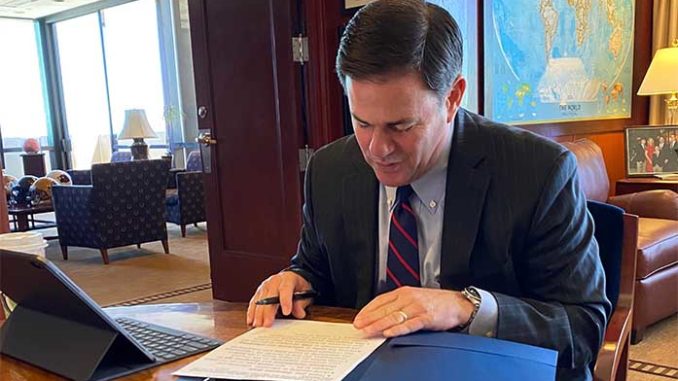
Nine months after Gov. Doug Ducey issued his first COVID-19 emergency order and with several of his decrees still in effect, some legislators will spend Wednesday studying Arizona’s Military Affairs and Emergency Management statute.
The 10-member committee, co-chaired by Senator Michelle Ugenti-Rita and Representative Gail Griffin, will be presented with a legislative history of the state’s emergency statutes, legislative authority for oversight of those powers, and an analysis of how other areas are approaching COVID-19.
There will also be testimony put forth by attorney Ilan Wurman about the constitutional separation of powers in relation to the governor’s emergency executive powers.
“I’ll be testifying about fundamental separation of powers principles, and how the Governor’s interpretation of his emergency powers violates those principles,” Wurman told Arizona Daily Independent. “I’ll suggest some ways the legislature can amend the emergency statutes to clarify the statutes don’t give the Governor as much power as he seems to think they do.”
It is a topic Wurman knows well, and one the associate professor with ASU’s Sandra Day O’Connor College of Law is preparing to argue to the Arizona Supreme Court over the next several weeks.
Wurman is currently suing Ducey and two state agencies on behalf of more than 100 bar owners who operate under a Series 6 or 7 state liquor license. The licensees contend the governor’s COVID-19 executive orders have been “fundamentally arbitrary and discriminatory” to the point of causing “severe financial harm” to their businesses.
On Tuesday, Chief Justice Robert Brutinel issued an order granting direct transfer of Wurman’s clients’ case from the Maricopa County Superior Court to the supreme court, bypassing a normal stop at the Arizona Court of Appeals.
Brutinel also set several key deadlines in the case and scheduled the case for oral arguments in front of the justices on March 9.
A Series 6 license allows for the sale of beer, wine and spirits, while a Series 7 license allows for the sale of beer and wine. Both permit off-sale business and do not require a percentage of revenue to be generated by food sales. Restaurants, by comparison, operate under a Series 12 license which prohibits the sale of alcohol for off-site consumption.
Wurman’s bar owner clients argue Ducey exceeded his statutory authority in several ways, including the establishment of different closure and reopening orders for different types of liquor licenses. Another claim is that when Ducey allowed restaurants to reopen before bars, he illegally allowed Series 12 licensees to engage in off-sale, or to go, business to the financial detriment of the Series 6 and 7 owners.
The government also ordered law enforcement officials to look the other way when a restaurant violated the off-sale statute.
In September, Wurman’s arguments were bolstered by the Arizona Attorney General’s Office which issued an opinion that Ducey impermissibly discriminated between types of liquor license holders and “contravened” state law by giving off-site sales privileges to Series 12 license holders.
It also noted the governor “is not a lawmaker” and cannot indefinitely rely on the emergency powers statute without involving the legislature and judiciary.
A Maricopa County judge recently declined to override Ducey’s current COVID-19 executive orders, despite concerns that some of the bars may suffer “irreparable economic harm.”
But the judge pointed to significant concerns with the fact the governor allowed restaurants to engage in illegal sales of alcohol with impunity. Wurman then appealed the injunction denial but asked the Arizona Supreme Court to take the matter without having the case first decided by a court of appeals.
Attorneys for Ducey, as well as the Arizona Department of Health Services and the Arizona Department of Liquor Licenses and Control argued the bar owners petition to transfer the case directly to the Arizona Supreme Court should be denied as Wurman’s clients provided “no compelling reason to bypass the standard process and jump ahead of all other pending matters before this Court.”
Chief Justice Brutinel disagreed, granting the direct transfer request less than two weeks after Wurman filed it.
The other ad hoc committee members participating in Wednesday’s meeting are Senators Lupe Contreras, Sine Kerr, David Livingston, and Martin Quezada, along with Representatives Frank Carroll, Domingo DeGrazia, Randall Friese, and John Kavanagh.
For Livingston (LD22), the meeting is a chance to not only hear from presenters but also ask questions as the committee strives to identify options for legislative oversight during the pandemic.
“I believe in Best Practices and want to understand what other states are doing and what we need to improve, and fix,” Livingston said.
The public can listen to a livestream of the meeting via https://azleg.granicus.com/MediaPlayer.php?publish_id=2
